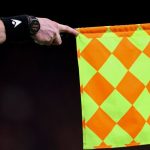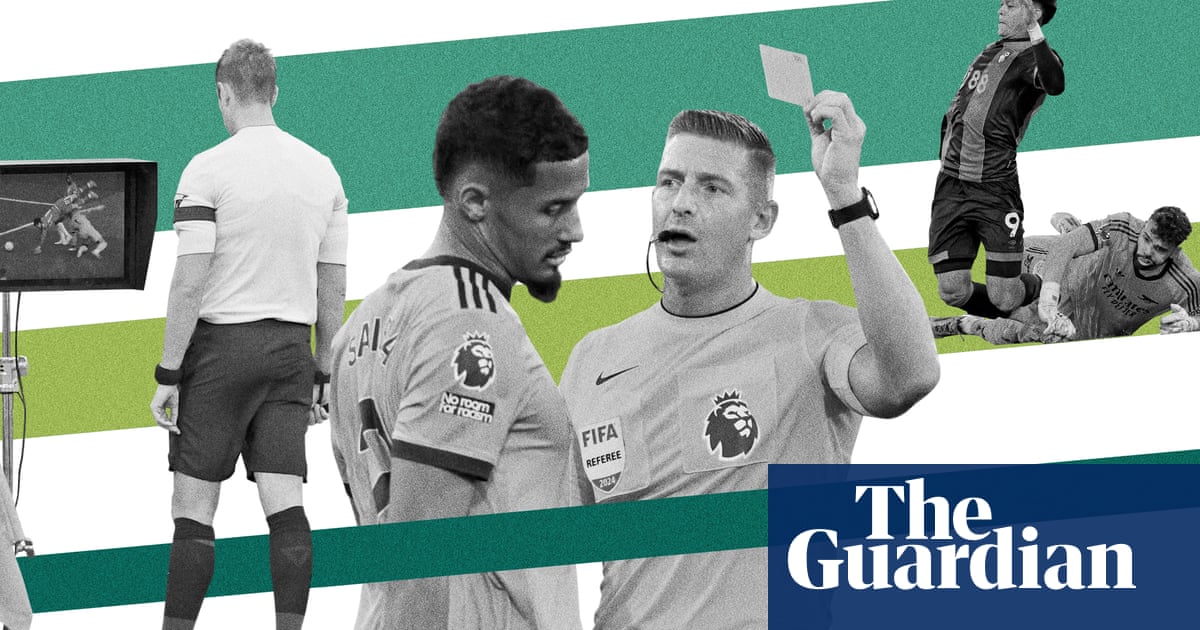Another weekend, another slew of wearying arguments about VAR and refereeing. At Bournemouth, Arsenal fans called the referee Robert Jones “a cheat” and chanted that the Premier League was “corrupt”. On social media, the outrage was even greater. Fans have always complained about referees, of course, but traditionally they called them “blind” and dismissed them as “wankers” or “bastards”. Then came the “You’re not fit to referee” song; the cries of systemic corruption, though, are relatively new.
Perhaps this is just the world we live in, one of distortions and paranoia, shaped by a diverse range of populist cynics from José Mourinho to Donald Trump, social media nurturing conspiracy theories which sprout from the fertile ground left as Covid retreated. Or perhaps there is something more complex going on.
But before we get to that, it’s worth stressing that none of the key decisions in the games involving the major title contenders at the weekend were in any sense terrible or inexplicable. William Saliba was rightly sent off in Arsenal’s defeat at Bournemouth; he deliberately pulled back Evanilson when the Brazilian was favourite to latch on to Leandro Trossard’s sliced pass, with Ben White about 30 yards away and unlikely to recover. Was the error obvious enough for VAR to intervene? Yes, clearly.
Although the foul itself was not dissimilar to Tosin Adarabioyo’s on Diogo Jota in Chelsea’s defeat at Liverpool, the context was very different. The ball Jota was chasing was moving much faster and was arcing off to the right; Levi Colwill, who was around five yards away, was favourite to get to it first. Evanilson, then, was denied a goalscoring opportunity; Jota was not.
The penalty Bournemouth were awarded was clear-cut, as David Raya tripped Evanilson. Even Mikel Arteta, whose constant complaints about referees have done much to encourage Arsenal fans’ persecution complex, wasn’t minded to complain, even if he didn’t go so far as to overtly accept the decisions were right.
The conspiracy theory favoured by Arsenal fans seemed to be that the VAR official Jarred Gillett, an Australian, was a boyhood Liverpool fan, which is why he has never refereed a Liverpool game in the Premier League. Saliba will now be suspended for Arsenal’s game against Liverpool. But even leaving aside the frankly childish idea that professional officials cannot be objective, the basic point remains that the decision reached was the correct one.
While the Saliba red card in an indirect way went for Liverpool, the two big VAR calls at Anfield both went against them: not only the non-dismissal of Adarabioyo, but also the overturning of a penalty when Robert Sánchez was deemed to have got enough on the ball before Curtis Jones went over the top of him for it not to be a foul. The case seemed borderline and Sánchez was probably saved by the fact that his forward momentum had slowed by the time of the collision. Whether VAR should have got involved is questionable, but the call was subjective; whether a penalty or not, it would be hard to say it was definitively wrong.
Manchester City’s last-minute winner against Wolves falls into a similar category. It could be argued that Bernardo Silva was close enough to the Wolves keeper José Sa when John Stones headed the ball goalwards to be interfering with him. He was close enough, after all, to have bumped into Sa as the corner was taken (when he was not offside), and had Stones’s header been directed towards Sa’s right-hand post it would have passed very close to Silva. But Silva was not in his eyeline, and the header went in the middle of the goal. When Wolves had a goal disallowed in similar circumstances against West Ham last season, their manager Gary O’Neil called it “one of the worst decisions I’ve ever witnessed”; his view was notably different this time. Which is to say that while, personally, I think that sort of thing should be offside, I understand why the goal might be given and don’t think it’s scandalous that it was.
But there’s no room for such grey areas from the hyper-partisan viewpoint of the modern fan, little room even for incompetence. Everything has to be part of a grand plot. Why that should not become the default is impossible to say with any certainty, but here’s a theory. Fans know the game is in grave danger; that mega-rich owners, far richer than any previous owners, have the potential to bankrupt whole competitions through repeated legal action of questionable merit. They know as well that the new breed of owners care nothing for the traditions of the game, disdaining regular fans for occasional visitors who regard a match as a day out and splurge on merchandise and overpriced stadium food.
after newsletter promotion
Owners are fleecing fans and reshaping the sport, dragging it away from the communities that have sustained it – and been sustained by it – for a century and a half. But that is too painful to accept. Against their might, the average fan is helpless and so, in a classic case of discomfort displacement, perhaps blinded by partisanship, they turn instead on the familiar enemy: referees.
-
This is an extract from Soccer with Jonathan Wilson, a weekly look from the Guardian US at the game in Europe and beyond. Subscribe for free here. Have a question for Jonathan? Email soccerwithjw@theguardian.com, and he’ll answer the best in a future edition












